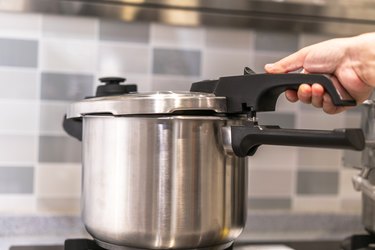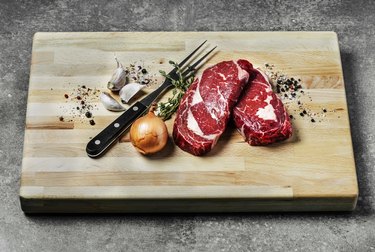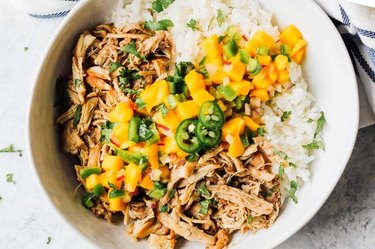
Pressure cookers can produce full meals in a much shorter time than conventional pots and pans. How do they work their magic? By artificially creating a high atmospheric pressure in the pot, which allows the trapped water and steam to reach temperatures well above the normal boiling point of water.
Like other cooking methods, a pressure cooker can give you either tender or tough meats, depending how you use it. Here's how to use a pressure cooker for tender meat.
Video of the Day
Video of the Day
How Pressure Cooking Works
- As water boils, it expands and creates clouds of steam. Pressure cookers trap the steam inside their tightly sealed lids, creating a pressurized environment inside.
- With the increase in pressure, the boiling temperature of the water and steam inside the pot can increase to as much as 257 degrees Fahrenheit.
- Water transfers heat better than air does, so this temperature cooks meat and vegetables very quickly compared to roasting or other dry-heat cooking.
Meats in a Pressure Cooker
The tenderness of meat depends on several factors. Some cuts are tender to begin with and have little or no chewy connective tissues. Other cuts, like the beef shoulder chuck, are tougher and have a lot of connective tissue.
Much of the connective tissue in meats is made of collagen, which breaks down when cooked and becomes gelatin. When cooked correctly, the connective tissues can make meats moist and rich instead of tough and chewy. Normally, you'd do that with a slow cooker, but a pressure cooker can melt the connective tissues much more quickly.
The Importance of Timing
Timing is especially important in pressure cooking, because it works so quickly. An extra minute or two can make the difference between a moist, tender pot roast and one that's dry and tough.
Always use reliable, modern recipes for your pressure-cooked meats. Your cooker's manufacturer is a good source for recipes, or you can try some recipes from our library:
It's also important to vent the pressure cooker according to the recipe's instructions. If you use the wrong method, your meat can become tough and dry.
Salvaging Overcooked Meats
It's not hard to tell if you've overcooked the meat in your pressure cooker: It will come out dry and chewy, as if every drop of moisture has been squeezed out of it.
Fortunately, if you treat it as a slow-cooking project, the meat will eventually become tender again. It will never be as flavorful or as moist as it was when freshly cooked, but it will give you lots of gravy to spoon over the slices of meat.



